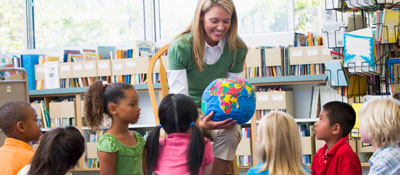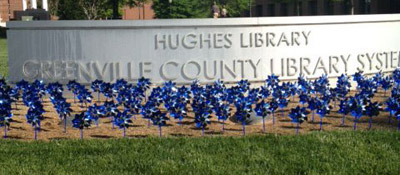Greenville First Steps believes parents play the most visible and essential role in ensuring a child starts school feeling healthy and ready to learn. But for many parents in our area, the resources and opportunities to help children get ready aren’t easily accessible—or even available at all.
That’s why Greenville First Steps partners to promote school readiness initiatives by enhancing the work that worthwhile agencies like local schools, state agencies, churches, non-profits, and neighborhoods are already doing in our community.


A “ready” family embraces their role as their child’s first and most important teacher. We support families by nurturing steady and supportive relationships that ensure safe home environments, promote good health, and foster curiosity and excitement about learning. Check out our feature resources for families:

"Ready" educators provide children and families with high quality instruction and surroundings that address the child's learning and development needs. Staff are trained and proficient in early care and education standards, and programs are sensitive to individual differences and cultural values. Check out our feature resources for educators:

A "ready" community accepts school readiness as a priority and supports families in their role as their child's first and most important teacher. Businesses, faith based organizations, health care entities, social services, community groups and local governments all work together to support children's education and long-term success. Check out our feature resources for communities:
80% OF BRAIN DEVELOPMENT HAPPENS DURING THE FIRST THREE YEARS OF LIFE.
During these early years of brain growth, infants and toddlers absorb massive amounts of information from interacting with other people. This early learning becomes the foundation for all future learning. The Basics are five fun, simple, and powerful ways to help all our children become he happiest and most successful they can be. Let's seize the opportunity. Learn more about Greenville's Palmetto Basics.
Nurse Family Partnership (NFP) is a nurse home visitation program, with 30 years of longitudinal research, that is designed to improve the health, well-being and self-sufficiency of low-income, first time parents and their children. Home visits span a 2 ½ year timeframe and begin prenatally and continue through the second year of the child’s life. Visits range from weekly to every other week but can be altered if the nurse feels there is a need for more visits. Bachelor’s degree-level nurses utilize guidelines, clinical consultation, and intervention resources to implement the programs in a way that is adaptable to each family.
Locally, NFP is a partnership between the Greenville Health System and Greenville First Steps. In 2010, it expanded to serve 125 families and in 2011, an additional 50 families were added to the program. Funding is provided by the Duke Endowment (7-year commitment), Greenville First Steps, the United Way of Greenville County (3-year commitment) and the Children’s Trust of South Carolina. Additional funding was provided through Hollingsworth Funds, the Community Foundation of Greenville and Greenville Women Giving.
To learn more about this proven program, visit the Nurse Family Partnership National Service Office website here.
Thanks to a partnership with Spin(a)tours, you can tour different areas of a typical, high quality child development center and kindergarten; a safe, engaging home environment; and various learning excursions.
Childcare Center Tour
Kindergarten Tour
When visiting a childcare center, here are some things to keep in mind:
What does a nurturing, engaging home look like? Thanks to a partnership between Greenville First Steps, Safe Kids Upstate and LiveWell Greenville, the following virtual home tours provide safety tips, paired with healthy and engaging activities.
House Tour
Apartment Tour
There are all kinds of great learning opportunities throughout the community, but how can your child get the most out of these experiences? The following virtual tours provide tips and insight into what various locations have to offer.

Read Greenville is a community wide awareness program designed to help spread the word about the importance of reading daily. Through a collaborative partnership with local organizations, Read Greenville educates the community about the importance of literacy, provides strategies and ideas for engaging children and adults, and gives the tools necessary to create a literacy filled world for our residents. Greenville First Steps encourages all families to read to their children daily. Whether it is a child's favorite book that you've read 300 times or a magazine that came in the mail, find time every day to sit together and explore the world of reading.
Tips for Reading to Your Children
Palmetto Shared Services Alliance (PSSA) is a system of online and on-site supports designed to help childcare and after-school providers save time, money, and improve over-all quality. Components of Palmetto Shared Services Alliance include shared buying power, access to online resources, professional development opportunities, live childcare availability, and parent resources.
To learn more about this program, visit the Palmetto Shared Services Alliance website here.
Triple P, the Positive Parenting Program, is one of the most effective evidence-based parenting programs in the world, backed up by more than 35 years of ongoing research. Triple P gives parents simple and practical strategies to help them build strong, healthy relationships, confidently manage their children's behavior, and prevent problems developing.
Family Connects Greenville
Family Connects Greenville is a partnership between SC DHEC and Greenville First Steps. The program supports parents by linking DHEC nurses, community resources, and families. The goal is to connect new parents with resources that support newborns and their families. This program is made possible by funding from Greenville Health Authority, Margaret Linder Southern Endowment, SC DHEC, and Greenville First Steps
How does the connection occur?
A Family Connects Greenville team member visits families in the hospital and has a brief check-in. If families are interested, a home visit is scheduled to occur in the following 3 or 4 weeks.
How can Family Connects Greenville help my family? The Family Connects curriculum provides a framework for families to get the right help at the right time. Family Connects home visits work to help parents who have questions or want to know where to go to get additional resources or supports.
Visit www.FamilyConnectsGreenville.com for more information and to get connected.
Dolly Parton's Imagination Library
Dolly Parton's Imagination Library is a free resource that mails a book to a child every month until their fifth birthday. Learn more.